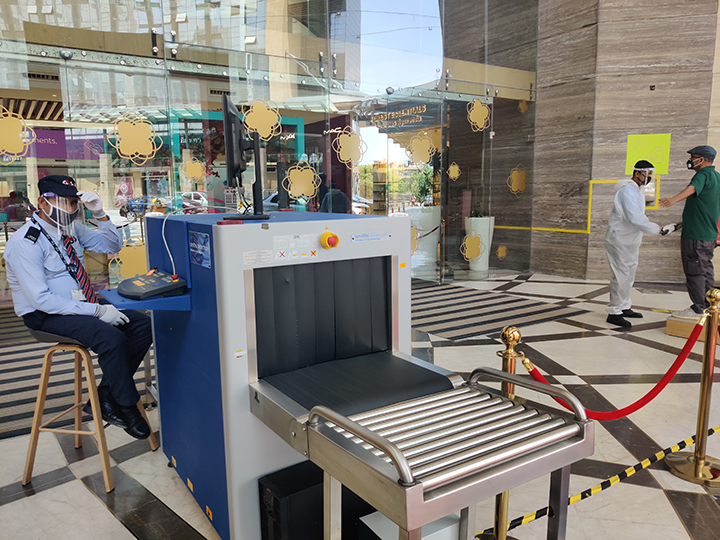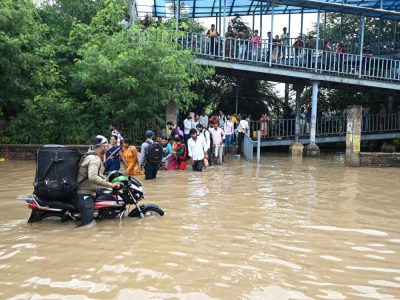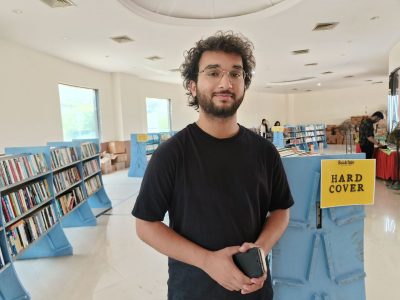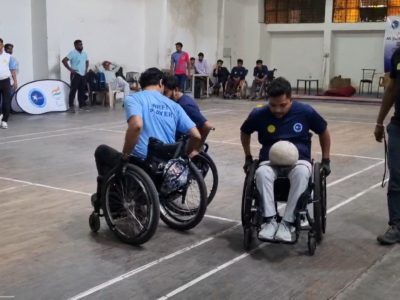Lifting of the lockdown in a bid to revive the economy despite rising cases of Covid-19 has not brought back shoppers in significant numbers but there are signs of green shoots
Delhi is limping back into some semblance of normalcy. But you walk into malls, and it’s anything but normal with the spraying of disinfectants, the guards in their PPE suits, the body temperature check.
It has been over two weeks since Chief Minister Arvind Kejriwal announced that malls, restaurants and religious places in Delhi would open from 8 June. The lockdown to combat Coronavirus lasted 10 weeks. Slowly, business is picking up though restaurants largely remain closed for dine-in operations, with delivery being the major chunk of their business. Malls are mostly empty, except with a rise in footfall during weekends and sale offers being the major pull factor.
Vegas Mall in Dwarka happens to be a toddler when it comes to shopping centres in Delhi. It opened its doors just last year on 15 November. After hardly five months in operation, it was forced to shut down when the government announced the lockdown from 25 March.
Now there are a few families and lone rangers that can be spotted in shops; the guards, shop assistants, and housekeeping staff outnumber customers. But Director Bharat Sisodia, does not think the numbers are disappointing. With last weekend seeing an increase in sales by 34%, he says it is a positive sign that things are getting back to normal. “By the time we were facing our end-of-season sale we had to face Covid-19. At that time we were 75% operational in terms of occupancy. The footfall is less than pre-Covid time as consumption has reduced”.
Alon Biswakarma, marketing head of Vegas Mall, says that in the month of February, before lockdown, the weekend would see a footfall of about 10,000-12,000. Now, with the lockdown removed, last Saturday saw about 3,000 people entering its premises.
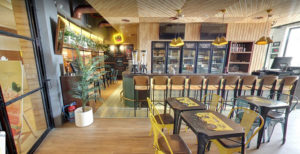
Sisodia says their immediate priority is to boost confidence in consumers, “that is the only marketing communication that we are doing these days.” Retailers, on their part, are pushing for online sales, and giving an option to customers to buy online and pick up offline so that it reduces time for delivery.
Patriot met two shop assistants who said their salaries had been cut. “What to do, that’s just how it is. Things are slowly picking up. Yesterday we had sales of about Rs 30,000 in a day. Over the weekend we did about Rs 90,000. It’s because people are coming and buying in bulk and also, we have sale so that is attractive”.
For now, the mall has only food courts functioning, with all individual restaurants like Chilis and Barbecue Nation remaining shut.
Biswakarma says along with the challenges, they have also been facing a shortage of staff. He said there were two reasons for this, “Some staff are not willing to come out of fear”, and some had moved back to their hometowns and were unable or reluctant to return.
The lockdown saw an unprecedented movement of migrants back to their hometowns as they were left jobless, some with no money and no backup. Thousands were stranded at the borders; some started walking back home until respective governments woke up and decided to help.
Atul Bhargava, president of the New Delhi Traders Association, says many restaurants in Connaught Place (CP) would be facing the same plight of staff shortage. “There are many restaurants where the staff is drawn from villages, so they will be facing a problem. For shops, there’s no problem. In fact, if the number of staff decreases by 25-30% it’s the need of the hour. You can’t afford them nor can you have so many present at a time, so you have one set coming in one day and another the next day.”
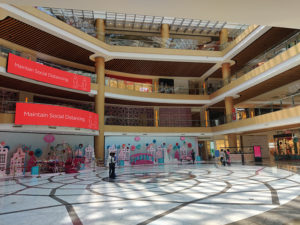
“People are finding it hard to hold on to the staff, there are salaries to be paid, EMIs and loans”. In the case of restaurants, Bhargava says they paid their excise duty in the month of February for the whole year. Now with things stuck in a limbo, restaurants have asked for the money back but the government has not relented.
Shrishti Desai (name changed), who would visit CP often before the lockdown, says she recently visited her favourite haunts but found many restaurants closed. The one they finally found was not serving alcohol. And that’s because in the Unlock 1.0 alcohol is still not allowed to be served.
For many like Desai, CP was a place to shop and stop for a quick drink and a bite — pleasures which are now becoming a distant memory.
Delhi Metro’s Rajiv Chowk station, which provided connectivity to the shopping plaza for thousands every day, is closed. This also accounts for thinner crowds. While Bhargava says the Metro has little to do with fewer sales — “The Metro gave us about 15% of our customers” — restaurants would surely bear the brunt of this lifeline for Delhi’s residents being offtrack. The progress to normalcy he says has been very slow as people are still fearful, and the government has made zero effort.
“CP is the best place to go because there is so much open space, open corridors, and a lot of parking area. Stores are maintaining the norms. The most unfortunate part is they (the government) have given us no rebate on taxes, and no relaxation on loans. Delhi Police should ensure that people wear masks.”
He believes that the government is scaring away the customers by projecting a rise in positive cases. “On one hand, they say start your business, and on the other hand the Deputy CM (Manish Sisodia) is saying cases will rise to 5.5 lakh by July. You’re discouraging people to come out. You can’t have both these things working”.
Sisodia had said that by July-end, the total number of Covid-19 cases in the national capital would rise to over 5,50,000 and that 80,000 beds would be required for those infected.
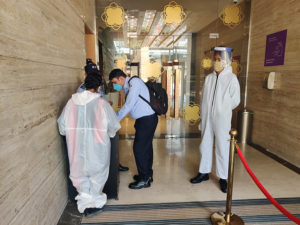
Few takers for dining in
“Khan Market is bustling”, Desai says. A fan of Big Chill’s New York cheesecake, she says she had to go and get some when it finally opened. “We were made to stand outside where our orders were taken, the payment made and food delivered.”
Many restaurants are confining themselves to home delivery and takeaway, with the dining rules mandating restaurants ensure only 50% seating capacity, with guests seated at least at 6 feet distance, disposable menus, paper napkins, and also closing time being 9 pm.
L’Opera, a French bakery and pastry chain in Delhi, has made a good comeback after lockdown in its Khan Market outlet. Kazem Samandari, the Executive Director says revenue here is 75-80% of what it was pre-Covid, “I wish all the other outlets were like this one. But they are doing about 50% of the pre-Covid revenue. The biggest loss is being faced in venues where our majority revenue came from dining.”
When the lockdown began, Samandari says they understood a change was required in how they function. They reinforced their online sales capabilities and revamped the website, “We developed 24-hour phone services. We have our own delivery system with 13 waiters who deliver, ensuring to our customers that we give contactless, quality, delivery”.
Interestingly the bakery found a way to serve its customers even at the nascent stage of the lockdown when only essential services were allowed. “In the very first phase, we limited our production. From April 4, we were allowed to have 12 employees, provided they would stay and not leave the production centre. We had to transform part of our production centre into dormitories. The group of 12 people stayed there for a month and half.”
Now, with shops opening, Samandari says, they have given much thought to ensure contactless service, down to the cash. “It goes into a special box which is left there for 24 hours. We never use the cash that is given on the same day. We encourage people not to use cash but if they do, we have this in place. Our delivery service is completely cashless.”
And deliveries are the way forward during the pandemic that is still very prevalent. A recent study by Facebook and Boston Consulting Group says customers will continue to choose the online model to shop. The Facebook-BCG study found that 90% of consumers who have purchased apparel online during the lockdown are willing to continue. This figure is 80% cent for food-related and 84% for non-food sub-categories within consumer-packaged goods (CPG) categories.
In fact, for some, being stuck indoors means a surge in impulse buying. Desai says the lockdown only made her itch to shop worse. “Before the lockdown, I would spend on transportation, going out to eat, but now even though I don’t have such expenses I’m not saving a dime because online shopping has me hooked”.
While online retailers like Myntra are offering big discounts, brick-and-mortar stores like Zara, H&M, Pramod, and even cosmetics stores like Sephora are promoting rate cuts to rope in customers who may still be reluctant to step into a store, but would find it easier to shop online. Nimish Arora, Director and Interim CEO, Select Citywalk, says that currently, a lot of brands are on discount because this period also coincides with the mid-year end-of-season sales.
“The impact of the crisis has been such that people are being extra cautious about stepping out. For us, it is very important to consider their safety and hygiene so that they can visit the shopping centre more often and feel safe inside”.
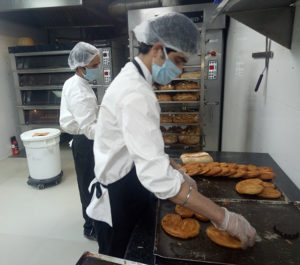
Citywalk is one of the malls in Delhi which used to get a huge footfall but the numbers are still not anywhere close to what they used to be. Arora says that before the lockdown, the mall would see as much as 30,000-35,000 footfall over weekdays, which would increase to around 40,000-45,0000 during weekends. “Post the mall reopening, we have seen a gradual increase in the footfalls. From Day 1, we saw almost 4,500 customers, and over 7,500 customers on the following days. The numbers are increasing steadily.”
The mall says it’s following all the guidelines in place, it even has a special self-isolation room in case of suspected positive cases.
But many shoppers are still sceptical. Some may be braving it out, but someone like Abenla, who earlier loved visiting the mall almost every weekend, says it is frightening to even think about. “I have not shopped for any clothes, or shoes or accessories since the lockdown. I don’t shop online because I like seeing things before buying them. I don’t know when I’ll decide to step out”.
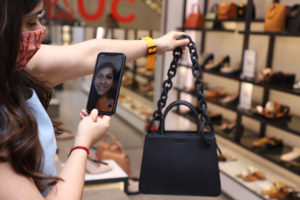
It is a real fear, and the fear is very much valid. Delhi’s Covid curve is not flattening, in fact it is still on an upward climb. Delhi is growing at the fastest rate among the top 10 states with the most caseload in India. It recorded 3,788 new Coronavirus cases on 24 June, taking the total tally to 70,390, while the death toll climbed to 2,635. On Tuesday, the national capital reported a record of 3,947 cases, the highest single-day spike till now.
Perhaps online shopping and delivery is still the best bet for now. For those who do want to step out, mask and sanitiser are your best friends.
(Cover: Spraying of disinfectants, temperature checks at malls, are the new normal // PHOTO Sashikala VP)

